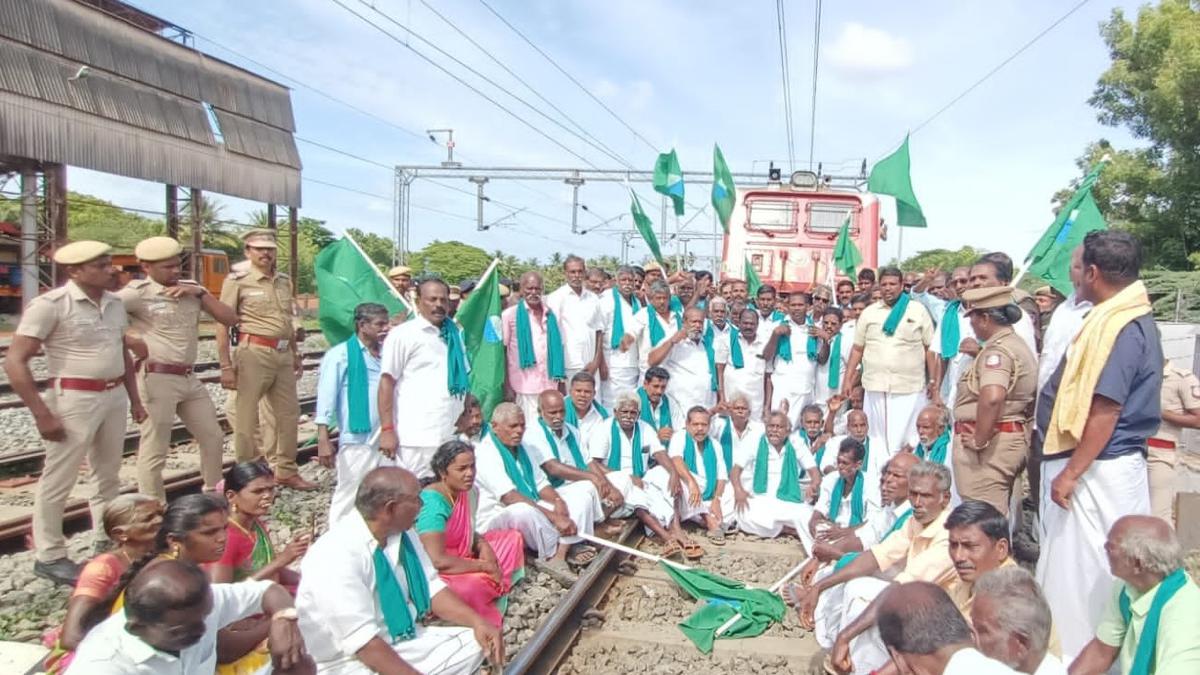
Farmers stage rail roko demanding release of Cauvery water
The Hindu
Farmers in TN's delta districts stage rail roko agitating for release of Cauvery water, demand ₹35K/acre for kuruvai season & ₹15K/acre for samba season. Police detain protestors, register case against 126. Demonstrations outside Thanjavur, Nagapattinam & Sirkazhi railway stations.
Members of the Coordination Committee of All Farmers Associations of Tamil Nadu on Tuesday resorted to rail roko agitations in delta districts urging the Union government to take immediate steps to release water in Cauvery River.
Hundreds of farmers led by P.R. Pandian, president of the Coordination Committee of All Farmers Associations of Tamil Nadu, blocked the Mannargudi - Mayiladuthurai passenger train near Tiruvarur junction and staged a protest by sitting on the railway track. The protesters also held banners, and flags and raised slogans urging the Union government to consider their charter of demands.
Mr. Pandian said the Union government should take immediate steps to release Tamil Nadu’s share of Cauvery water and prevent the Karnataka government from constructing a dam across the river at Mekedatu. He also demanded the construction of a dam at Rasimanal near Hogenakkal.
The farmers also sought a compensation of ₹35,000 per acre for the kuruvai season as standing crops in delta districts withered without water for irrigation and demanded ₹15,000 per acre as an incentive to start the samba season.
Police removed the protestors from the spot and detained them at a private marriage hall. Later in the evening, they were released. The Tiruvarur district police have registered a case against nearly 126 protestors.
Similarly, the farmers also attempted to stage a rail roko in Thanjavur, Nagapattinam, and Mayiladuthurai districts. Since police prevented them from entering the railway stations, they staged demonstrations outside Thanjavur, Nagapattinam, and Sirkazhi railway stations.

“Writing, in general, is a very solitary process,” says Yauvanika Chopra, Associate Director at The New India Foundation (NIF), which, earlier this year, announced the 12th edition of its NIF Book Fellowships for research and scholarship about Indian history after Independence. While authors, in general, are built for it, it can still get very lonely, says Chopra, pointing out that the fellowship’s community support is as valuable as the monetary benefits it offers. “There is a solid community of NIF fellows, trustees, language experts, jury members, all of whom are incredibly competent,” she says. “They really help make authors feel supported from manuscript to publication, so you never feel like you’re struggling through isolation.”

Several principals of government and private schools in Delhi on Tuesday said the Directorate of Education (DoE) circular from a day earlier, directing schools to conduct classes in ‘hybrid’ mode, had caused confusion regarding day-to-day operations as they did not know how many students would return to school from Wednesday and how would teachers instruct in two modes — online and in person — at once. The DoE circular on Monday had also stated that the option to “exercise online mode of education, wherever available, shall vest with the students and their guardians”. Several schoolteachers also expressed confusion regarding the DoE order. A government schoolteacher said he was unsure of how to cope with the resumption of physical classes, given that the order directing government offices to ensure that 50% of the employees work from home is still in place. On Monday, the Commission for Air Quality Management in the National Capital Region and Adjoining Areas (CAQM) had, on the orders of the Supreme Court, directed schools in Delhi-NCR to shift classes to the hybrid mode, following which the DoE had issued the circular. The court had urged the Centre’s pollution watchdog to consider restarting physical classes due to many students missing out on the mid-day meals and lacking the necessary means to attend classes online. The CAQM had, on November 20, asked schools in Delhi-NCR to shift to the online mode of teaching.









